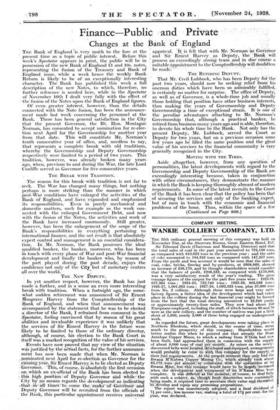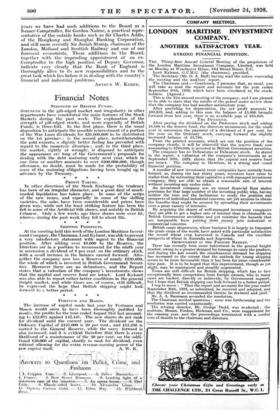Finance Public and .Ptiitate
Changes at the Bank of England
THE Bank of England is .very much to the fore at 'the present .time as a topic of public interest.' Before this week's Spectator appears in print, the public will be in possession of the new Bank of England £1 and 10s. notes, representing the -fusion of the Treasury and Bank of England issue, while a week hence the weekly - Bank Return is likely to be of an exceptionally interesting character. The Bank has published this week a full description of the new Notes, to which, therefore, no further reference is needed here, while in the Spectator of November 10th I dealt very fully with the effect of '-the fusion of the Notes upon the Bank of England figures. Of even greater interest, howeVer, than the details connected with the Note fusion, has been the announce- ment made last week concerning the personnel at the Bank. There has been general satisfaction in the City that the present Governor, the Rt. Hon. Montague Norman, has consented to accept nomination for re-elec- tion next April for the Governorship for another year from that date. This will constitute Mr. Norman's tenth consecutive year of office, and, needless to say, that represents a complete break with old traditions, whereby the Governorship and Deputy Governorship respectively were limited to a period of two years. This tradition, however, was already broken many years 'ago, when, previous to and during the War, the late Lord Cunliffe served as Governor for five consecutive years.
. THE BREAK WITH TRADITION. - :-The reason for this break -With tradition is not far to igeek. - The War :has changed Many things, -but -nothing perhaps - is more striking. than the manner in which poitlWar conditions haVe enlarged the activities of the Bank- Of-Enkiand, and _hay.e expanded and emphasized its responsibilities. Even in purely _mechanical . and . domestic matters, such for example as the work con- nected with the enlarged Government Debt, and now 'with the fusion of the Notes, the activities and work of the. Bank have increased enormously. Still greater, 7hOweVer,' has been the enlargement of the scope of the Bank's.. responsibilities in everything pertaining to international finance, and the net result is-that absolutely expert control and management is an essential considera- tion. - In-. Mr. Norman, the -Bank. posiesses - the ideal qualified—banker, the banker, moreover, who_ has been in touch with every phase .of :War and post-War financial development and. :finally the :banker who, by' reason of the part.. played during the past decade, enjoys the confidence not only of the City but of monetary centres all over the Verld:. THE NEW DEPUTY.
In yet another respect, however, the Bank has just Made a further, and in a sense an even mere interesting break with tradition. When a fortnight ago, the some- what sudden retirement' was announced of Sir Ernest Musgrave Harvey from the Comptrollership of the Bank of England, and when that announcement was accompanied by the .statement that he was to be elected a 'director of the Bank, I refrained from comment in the Spectator; feeling convinced that by reason of 'his great abilities and- inValuable eiperienee it Was :unlikely that the services of Sir Ernest Harvey in the future were likely to be limited to those of the ordinary: 'director, although, of course, his election to the Bank Court in itself was a marked recognition of the value of hii services. Events have now -proved that my view of the sib:la60h' Wfi.5 justified-by the aatilal,facts, for the further announce- ment has now been made -that when Mr. 'Norman is _nominated next April for re-election as Governor for the 'ensuing Year, Sir Ernest IlatVeyis to ge elected. as Deputy Governor. This, of Course, is absolutely the first occasion .oft -which an .ex-offieial of the Bank has been -elected to 7 this high 'position .-of Deputy. Governor and whilef the City By no means-regards the-development as indicating come tliel-ranki 'of -Governor=and Deputy Governor will be recruited from the officials of the Bank, this particular appointment receives universal approval. lt,is felt that with Mr. ,Norman 'as oopi:hor -and "Sir Ernest Harvey.. as Deputy, the -Bank will possess an exceedingly strong team and in due eciiirSe a suitable appointment to the CoMptrollership Will doubtless - made:---' '• = ' • ' Comptrollership THE RETIRING DEPUTY.
: That Mr. Cecil Lubbock, who has been Deputy foithe past two years, should now be seeking relief fronic his onerous duties which have been 'so admirably fulfilled, is certainly no matter for surprise. The office of Deputy, as well as of GoVernor, is a whole-time job and usually those holding that position have other business interests, thus making the years of Governorship and Deputy Governorship a time of exceptional strain. It' is one of the peculiar advantages attaching to Mr. Norman's Governorship that, although a practical banker, he retired from business many years ago and-is able, therefore, to devote his whole time to the 'Bank. Not only has the present Deputy, Mr. Lubbock; . served the Court as Depiity for two_ years, but on a previous occasion some few years ago he filled the same position and the g cat value of his' services to the financial community is very generally recognized in the City.
MOVING WITH THE TIMES.
Aside altogether, however, from any que.Stinn: of personalities, the latest developrtients with regard to the . Governorship and Deputy Governorship of the Ban.k.are exceedingly interesting because, taken in conjunction with other- circumstances, they demonstrate the_ manner iii which the Bank is keeping thoroughly abreast of•modern reqUireinerrti. In some of the latest recruits to the Court of the Bank it has been clear that the policy. has been that .
of securing the Services not . only of the bankiug,.xpert, but of men in touch with the economic and financial problems of the hour. Thus, within the space of a few (Continued on Page 800.) years we have had such additions to the Board as a former Comptroller, Sir Gordon Nairne, a practical repre- sentative of the outside banks such as Sir Charles Addis, of the Henigkong and Shanghai Banking Corporation, and still more recently Sir Josiah Stamp, chairman of the London, Midland and Scottish Railway and one of our foremost economists, These_ additions to the Board, together with the impending appointment of an ex- Comptroller to the high position of Deputy Governor, indicate very clearly that the Bank of England is thoroughly alive to its new responsibilities and to the great task which lies before it in dealing with the country's financial and industrial problems. ARTHUR W. KIDDY.



















































 Previous page
Previous page